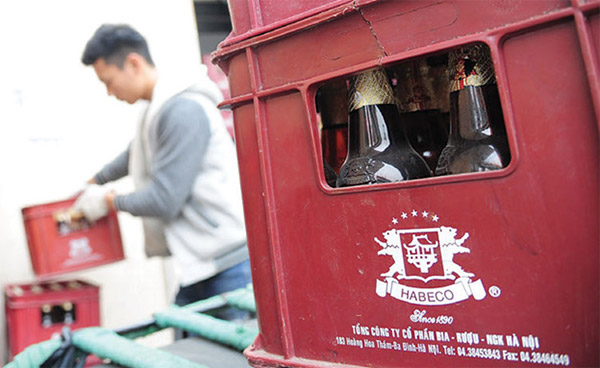Sabeco and Habeco divestment: three steps to avoid mishaps
 |
Avoiding the Vinamilk fiasco
With both stocks in the beer sector, the share sales of SAB and BHN should be carefully planned, otherwise they will not be optimal, according to experts.
Doctor Nguyen Dinh Cung, director of the Central Institute for Economic Management, warned that imprudent sale of SAB and BHN might fail to generate the optimal proceeds for the government. One thing to look out for is that these are both beer companies with many similarities. Therefore, if the government sells shares in both companies at around the same time, like it is planning to do now, there could be an oversupply of shares that would drive down the price.
“This is to be avoided, when selling government shares not only in companies that have been equitised, but also in companies about to go through equitisation. We should not repeat the conundrum of SAB and BHN: several years after their initial public offerings, investors waited for the stocks to be listed, but the listings and share sales are coming on each other’s heels, thus hurting the results,” Cung said.
Citing the recent lesson of Vinamilk, whose stock was among the most sought-after but failed to sell all of its recent offerings, Dang Quyet Tien, deputy head of the Enterprise Finance Department under the Ministry of Finance, said there needs to be a more effective approach to upcoming major offerings of government shares.
Three steps for transparency
| Sabeco, Habeco are among the companies that have violated financial transparency regulation as prescribed in the prime minister’s Document no. 404/VPCP-DMDN dated January 16, 2017 on financial supervision and efficiency evaluation at state-owned enterprises in 2015. In the list of companies that have missed the deadline to send their reports on financial supervision, recently publicised by the Ministry of Finance, besides Habeco and Sabeco, there are also Licogi, Vietnam Water And Environment Investment Corporation, and more. |
The government’s direction is to sell its shares in SAB and BHN after listing because this is a sector the state does not need to hold any stakes in. SAB and BHN’s stock market prices are one of the factors considered in building the plans to unload the shares. The trajectory of the SAB and BHN tickers is currently favourable, as SAB ended the trading session on March 20 at VND209,000 ($9.17), and BHN at VND93,100 ($4.09).
These prices, according to Tien, are only for reference. He added the SAB and BHN offerings will be conducted along with a revaluation of the enterprises during the planning process, because this is a transfer of state assets, not just normal assets.
The share sales will not take place by matching orders on the stock exchange or by agreements between holders and purchasers, but instead they should be done in three steps to avoid illicit activities causing losses to the state.
This means that after a public offering, companies will be sold in competitive bidding. If the shares still cannot be sold completely, then companies will be allowed to sell shares via agreements.
Even with this third approach, the buying and selling should take place in a public and transparent manner to generate the most benefit for the government.
Commenting on the government’s divestment from SAB and BHN, Tien said that the Ministry of Industry and Trade should turn over these two companies to the State Capital Investment Corporation (SCIC) for management and to coordinate the share sales. However, until now, the Ministry still represents government ownership in these two companies. Therefore, proposing the process for SAB and BHN to the government is the responsibility of the Ministry.
After Vinamilk’s failure, Tien added, as big companies, SAB and BHN’s share offerings should be carefully planned to avoid negative effects on the stock markets at a time when the scale and demand of the market are small.
The sales should follow the right steps, based on assessment of real market demand, to avoid a miscalculation of the appetite to invest, which would result in not all the shares being sold and damaging the reputation of the companies and the owner.
Commenting on Carlsberg’s request to be the first in line to buy the government’s shares in BHN, as per a strategic investment agreement signed by both parties (Carlsberg currently holds a 17 per cent stake in BHN), Tien said this privilege comes with Carlsberg’s pledge to fulfil responsibilities with BHN. However, Carlsberg failed to meet several commitments and should even be fined. Therefore, this agreement can no longer be enforced.
As a result, the question of whether Carlsberg’s request to have priority in buying the government’s shares in BHN has any merit will need to be thoroughly examined to avoid hurting the government’s efforts.
What the stars mean:
★ Poor ★ ★ Promising ★★★ Good ★★★★ Very good ★★★★★ Exceptional
Latest News
More News
- The generics industry: unlocking new growth drivers (February 04, 2026 | 17:39)
- Vietnam ready to increase purchases of US goods (February 04, 2026 | 15:55)
- Steel industry faces challenges in 2026 (February 03, 2026 | 17:20)
- State corporations poised to drive 2026 growth (February 03, 2026 | 13:58)
- Why high-tech talent will define Vietnam’s growth (February 02, 2026 | 10:47)
- FMCG resilience amid varying storms (February 02, 2026 | 10:00)
- Customs reforms strengthen business confidence, support trade growth (February 01, 2026 | 08:20)
- Vietnam and US to launch sixth trade negotiation round (January 30, 2026 | 15:19)
- Digital publishing emerges as key growth driver in Vietnam (January 30, 2026 | 10:59)
- EVN signs key contract for Tri An hydropower expansion (January 30, 2026 | 10:57)
















 Mobile Version
Mobile Version